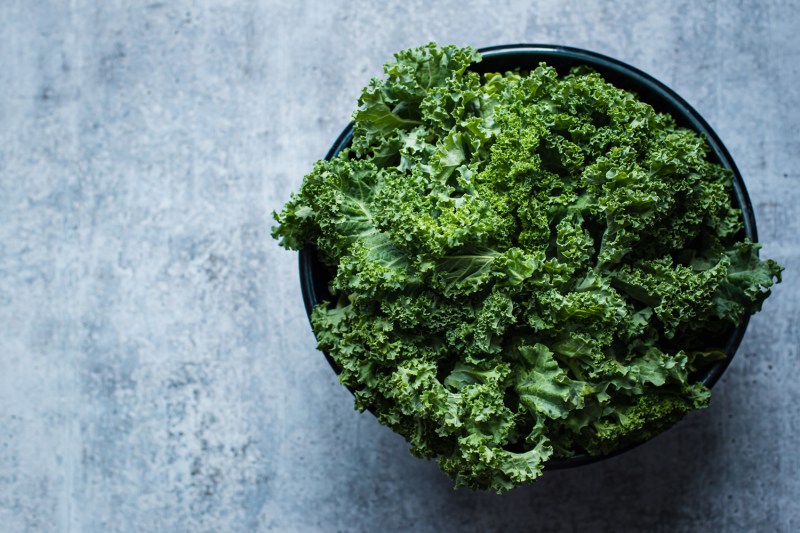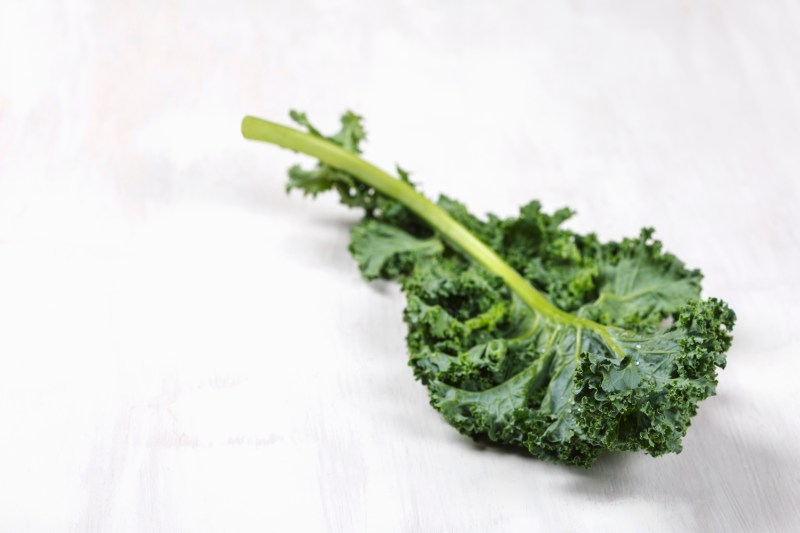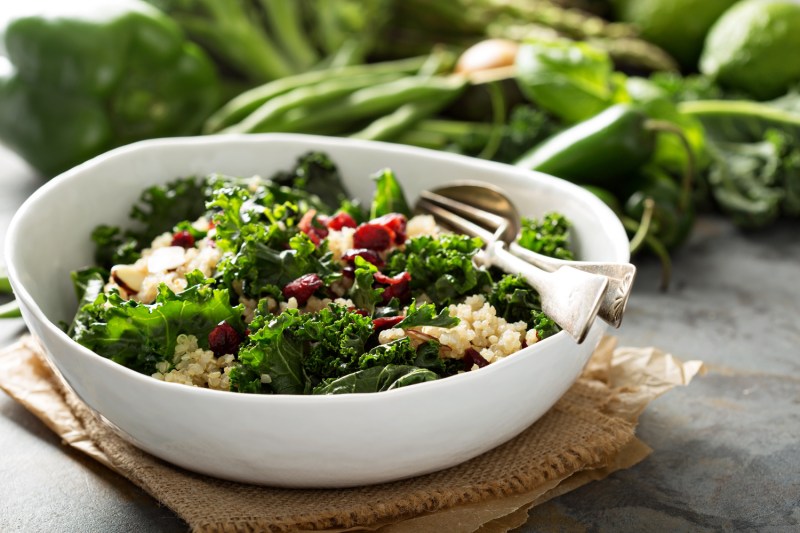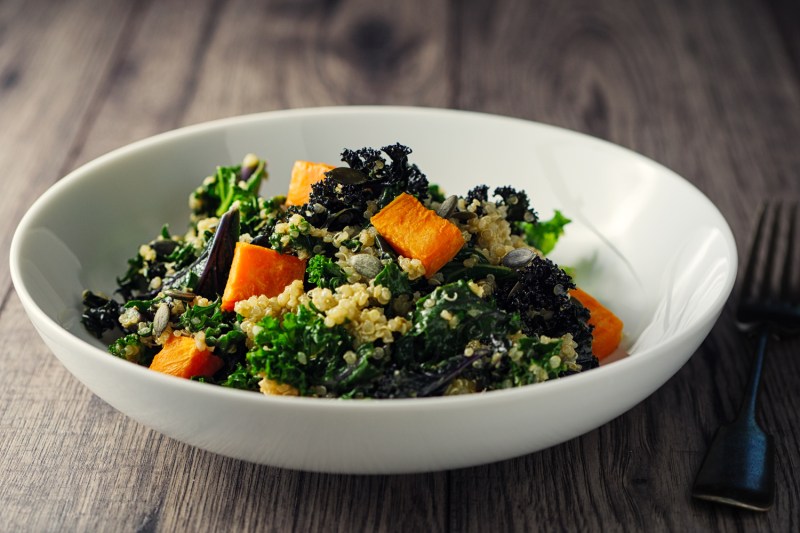Although some people love kale while others hate it, no one can deny that it is a nutritious power good and a staple of many health food diets. Being among the healthiest of greens, there are numerous benefits of kale, and it is chock-full of vitamins that can assist in preventing a long list of ailments. Similar to broccoli, cabbage, and Brussels sprouts, kale is a cruciferous vegetable.
Though it’s long been a regular feature in the ultra-healthy Mediterranean diet, its benefits have only recently made it a mainstream star on the healthy eating scene. Once you learn just how good kale is for you, you’ll wonder how you’ve missed out for so long!
How to easily implement kale into your daily diet

With its incredible crunch and aggregable flavor profile, kale can fit into your daily diet in all the places greens would ordinarily go. Mediterranean salads feature kale as a base for a wealth of other healthy veggies. It’s also a great ingredient in bean soups and omelets, increasing the fiber and flavor of the meal as a whole.
You can steam kale like you would spinach, and you can even blend it into smoothies and green drinks for an extra blast of nutrients. One cup of kale is considered a serving, and with no more than 2.5 servings per week recommended for optimal benefits, it’s effortless to add kale to a few meals throughout your daily eating. Be sure to pair it with healthy fats like olive oil to ensure proper uptake of vitamins and minerals.
The benefits of kale

Vitamins and minerals
With a roster of nutrients that includes vitamins A, C, K, and E, kale provides a bounty of vitamins and minerals in every serving. Vitamin K is especially significant for maintaining general good health and physical strength; this substance plays an essential part in helping your blood clot and maintaining bone strength.
But it isn’t enough to just include kale in your diet in order to reap the benefits. Since vitamins A, K, and E are fat-soluble vitamins, they’re best absorbed by your body when eaten with healthy oils. An easy salad dressing of equal parts olive oil and apple cider vinegar with a few seasonings can solve the problem.
Anti-inflammatory properties
In lab studies, kale has been proven to reduce inflammation in mice. One important condition this can help with is rheumatoid arthritis. While nutrients like beta-carotene and vitamin C help keep your joints healthy, the high vitamin K content in kale can reduce markers in your blood that cause inflammation. With inflammation being a presumed cause of many other conditions, including cancer, adding kale to your diet is an easy way to give yourself a healthful advantage. A few simple additions can provide you with a world of benefits for reducing inflammation.
Antioxidants
Being so rich in vitamins and minerals, kale also provides powerful antioxidants to protect cells from the damage caused by free radicals. This damage can lead to an array of diseases, and by finding places to include kale in your daily eating habits, you help counteract this damage and keep your cells healthy and whole. In addition, studies have proven that raw kale contains a higher concentration of antioxidants than cooked kale, so be sure to factor it into salads and smoothies to get the highest nutritional value.
Detoxifying properties

The antioxidants in kale help detoxify your blood, as well. By keeping your cholesterol in check, kale helps your liver stay healthy. Kale is also an alkaline food, which can help cleanse your blood of toxins. The fiber in kale also helps cleanse your colon as it passes through, giving your digestive tract a bit of detoxifying assistance.
As an added bonus, kale is a tremendous source of Omega-3 fatty acids, a great brain nutrient that also may help lower your anxiety levels. A cleanse for your body and your mind…is there anything kale can’t remedy?
High fiber content
Fiber is one of the most essential nutrients in your diet, and the high fiber count in kale can help you reach your daily recommended intake. Fiber provides many health benefits, including balancing blood sugar and regulating digestion. And because it makes you feel fuller for longer after eating it, fiber keeps your hunger at bay, which can help you lose weight. When paired with healthy fats to help vitamin and mineral uptake, kale is an easy and nutritious way to include more fiber in your daily eating, keeping you feeling satisfied and helping you attain your weight loss goals.
Low in calories

At 33 calories per cup, kale is one of the healthiest low-calorie foods around. Having such a high concentration of fiber, vitamins, minerals, and antioxidants in a food that stays well under 100 calories per serving means you can easily incorporate kale into your existing eating plan to reap the benefits.
Adding a serving or two per week to your salads can turn them into super-meals filled with extra nutrients. You can also replace lettuce with kale in sandwiches to give them an exciting low-cal, nutrient-rich punch that tastes great and adds texture to your usual fare.
Lowers bad cholesterol
Kale is a tremendous source of lutein, a chemical that helps prevent LDL — or bad cholesterol — from building up in your blood. Studies have shown drinking kale juice can lower LDL cholesterol and raise HDL — or good cholesterol — providing a double-whammy of good health that helps reduce the risk of coronary disease.
Juices that include kale can be a great way to help your cholesterol, but be wary of the higher sugar content that can possibly work against you. A smoothie that includes kale with a variety of fresh fruit is your best bet for keeping things on the beneficial side of the balance.
Are there any risks of eating kale?
With all its healthy magic, a few risks come from eating kale. High amounts of cruciferous vegetables, including kale, can affect your thyroid by blocking your iodine uptake. This can result in an enlargement of your thyroid, called a goiter. Also, if you take blood thinners, you may encounter difficulties with the vitamin K content in kale since these medications render that nutrient inactive.
As with any alterations to your diet, if you have special health considerations, it’s best to consult with your physician before making changes. This will ensure you get all the kale’s benefits without accidentally encountering any adverse effects.




